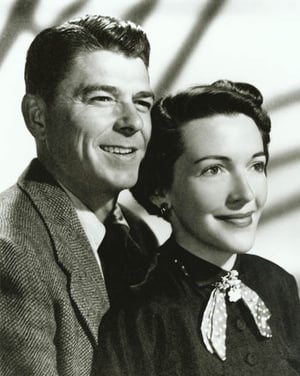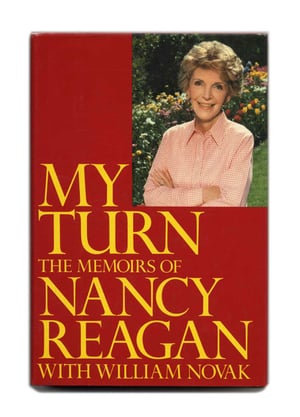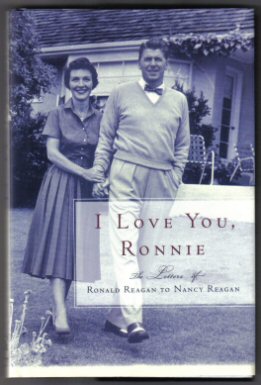The media seemed pleased to have Ronald and Nancy Reagan in the White House. They lauded the glamour they brought from Hollywood, and Nancy’s style was compared favorably with Jacqueline Kennedy. She was always perfectly coiffed and dressed in designer gowns the mass media reading public could never dream of affording. The list of books depicting Nancy Reagan's life is a lengthy one. Many depict Mrs. Reagan in an unflattering light, while others paint the picture of a love story between her and President Ronald Reagan. We've compiled several titles and descriptions here for your reading and collecting pleasures.
 First Lady: A Portrait of Nancy Reagan, Chris Wallace, 1986
First Lady: A Portrait of Nancy Reagan, Chris Wallace, 1986
NBC reporter and White House correspondent Chris Wallace condensed a series of interviews conducted for a television documentary on Nancy Reagan and published them as a book in 1986, along with more than 150 photographs.
Reviewers found the comments therein to be almost monolithically praising: that her life revolves around her husband and she hasn't likely had a substantive impact on policy. Many argued that the remarks tend to be repetitive and overall offer few new insights.
Behind the Scenes, Michael K. Deaver and Mickey Herskowitz, 1988
Michael Deaver was recruited to the Reagan administration and spent 30 years working for Ronald Reagan, building a close friendship with him and Nancy. He wrote a book, published in 1988, with Mickey Herskowitz, speaking as a White House insider.
He sees the Reagans as the one couple he knew that never needed anyone else. Ronald Reagan relaxed easily, trusted everything, and was beset by few doubts. Nancy is described as likely never sleeping deeply enough to have dreams, either mystical or mundane. She's described as intense, sometimes brittle in her manner. After the President was shot she became more independent, patient, and less sensitive to criticism.
Deaver's bottom line is that Nancy acted, when she acted, only to protect Ronnie. That she did not set policy, attend Cabinet meetings, or promote her own agenda.
Nancy penned an autobiography that reads, at least in part, as a defense of who she is or maybe it's who others seem to think she is.
My Turn: The Memoirs of Nancy Reagan, Nancy Reagan with William Novak, 1989.
 By her own account, she was a woman with a limited interest in, or comprehension of, affairs of state. She says she operated mostly on emotion and instinct, focusing on people, not policy. There's no surprise, then, that her unsurpassed love affair with her husband, and their troubles with their children, provide the most genuine and affecting passages in her book. The question becomes did the country get any real benefit from putting what was essentially a domestic relationship onto such a grand stage?
By her own account, she was a woman with a limited interest in, or comprehension of, affairs of state. She says she operated mostly on emotion and instinct, focusing on people, not policy. There's no surprise, then, that her unsurpassed love affair with her husband, and their troubles with their children, provide the most genuine and affecting passages in her book. The question becomes did the country get any real benefit from putting what was essentially a domestic relationship onto such a grand stage?
The Nancy that shines from these pages is forever being misunderstood, victimized by jealous and petty people, and targeted by spiteful journalists. She appears to be nearly overwhelmingly self-satisfied and self-righteous. She chose to be a public person long before coming to Washington, D.C., and her autobiography suggests she loved every moment of what was the climactic role of her career.
Nancy Reagan: The Unauthorized Biography, Kitty Kelley, 1991
The next Nancy Reagan book chronologically was, not unexpectedly, the juiciest of the ones on this abbreviated list. The Reagans and their friends denounced the book as wholly worthless trash.
However, overall that is not a fair indictment. There may be too many grudge quotes and the book may well be one-sided, but there is enough soundly researched material to present a reasonable overarching question. Can a woman actually get to the upper echelon of our society by building a career around just the right mix of promiscuity, infidelity, greed, duplicity, arrogance, abuse of her children, henpecking of her husband, browbeating of subordinates, and a healthy dose of self-pity?
Kitty Kelley says Nancy Reagan did just that. She does allow that it could well have been set in motion with the childhood insecurity fed by first being abandoned by her birth father and then left with an aunt while her birth mother tried to establish an acting career.
Oft-repeated tales of Nancy Reagan's poor mothering skills are presented. For example, the idea that she could pretend Ronnie's children from his first marriage simply didn't exist. And there are the reports of abuse and neglect because her daughter, Patti, just didn't fit the mold. Somehow Ron Reagan manages to avoid the carnage others have discussed. Regardless, Nancy may have disliked having to mother her children, but she did mother Ronnie. She treated him as a child.
Reviews of the book came to the conclusion that Kelley's biography just wasn't flashy enough to be great gossip. It also wasn't thoughtful enough to be a solid biography. And finally, it didn't cast light into enough corners to be impressive as history.
The Way I See It: An Autobiography, Patti Davis, 1992
As the buzz died down around Kelley's book, Nancy's daughter Patti Davis worked through her addictions, damaging childhood, and general family dysfunction by writing her book, The Way I See It: An Autobiography.
Her truth is more about a lot of small sadness and small mean acts rather than big horrors. She tells of a childhood in a home mostly silent, where the sounds were limited to the sound of Nancy's heels on the floor, and her aloof, demanding, and unfeeling treatment of the domestic staff. She describes her father as absent even when he was physically present.
Among Patti's allegations are that her mother—the just-say-no, anti-drug crusader—regularly popped a variety of pills, generally tranquilizers; that she was physically abusive, slapping Patti regularly, and totally controlling to the point of dictating what Patti could tell her therapists. Father Ronald Reagan was purportedly disengaged and distant, purposely clueless to the damage being done around him.
In looking to address why Ronald and Nancy were so deficient as parents, Patti posits that her father's father was an alcoholic and her mother's father abandoned her. She says that these beginnings taught them both to use denial as a way of coping with problems.
Whatever her intentions in writing the autobiography, for the most part, it is said to read like the work of an angry daughter looking to settle old scores.
I Love You, Ronnie, Nancy Reagan, 2000
 In counterpoint to a lot of what's been written about Nancy and Ronald Reagan, and certainly in counterpoint to a lot of what's discussed above, the last book on this curated list is a compilation of material he wrote to her over the years, with some reflections added by Nancy before publication of the book.
In counterpoint to a lot of what's been written about Nancy and Ronald Reagan, and certainly in counterpoint to a lot of what's discussed above, the last book on this curated list is a compilation of material he wrote to her over the years, with some reflections added by Nancy before publication of the book.
She kept everything he ever wrote over the decades they were together. He wrote to her constantly; to stay in touch, to express his love, thoughts, and feelings. This compilation is intended to show the private character and life of the president and first lady. Her reflections on these compiled writings are presented with love and insight. The media coverage declared that this love story spanned a half-century and that their private life comes vividly alive in a rare and inspiring book.
This book provided a backstory to the fairy tale their adoring public fervently believed in. For those who didn't believe, it provided a surface gloss to what sounds like a PR myth, but one that had a committed following of true believers that fairy tales do indeed come true.
There are other books, interviews, and articles about Nancy and about Ronald Reagan. Obviously, there are those about his politics and the world stage, but more material can also be found about their love story. Readers and collectors can discern for themselves whether they prefer to be enthralled by the storybook-like tales or troubled by the story's more sordid details.









